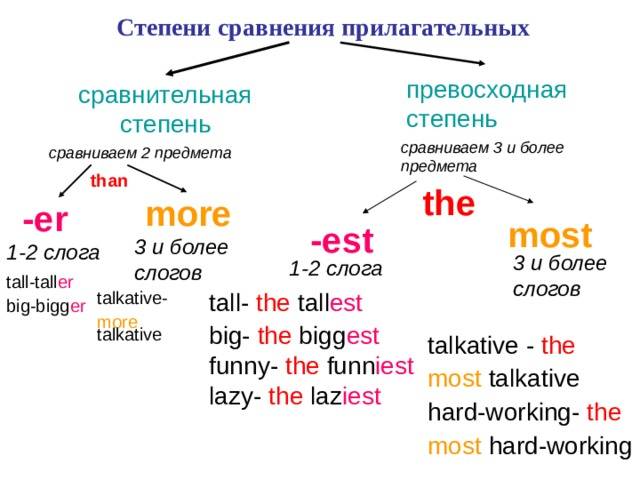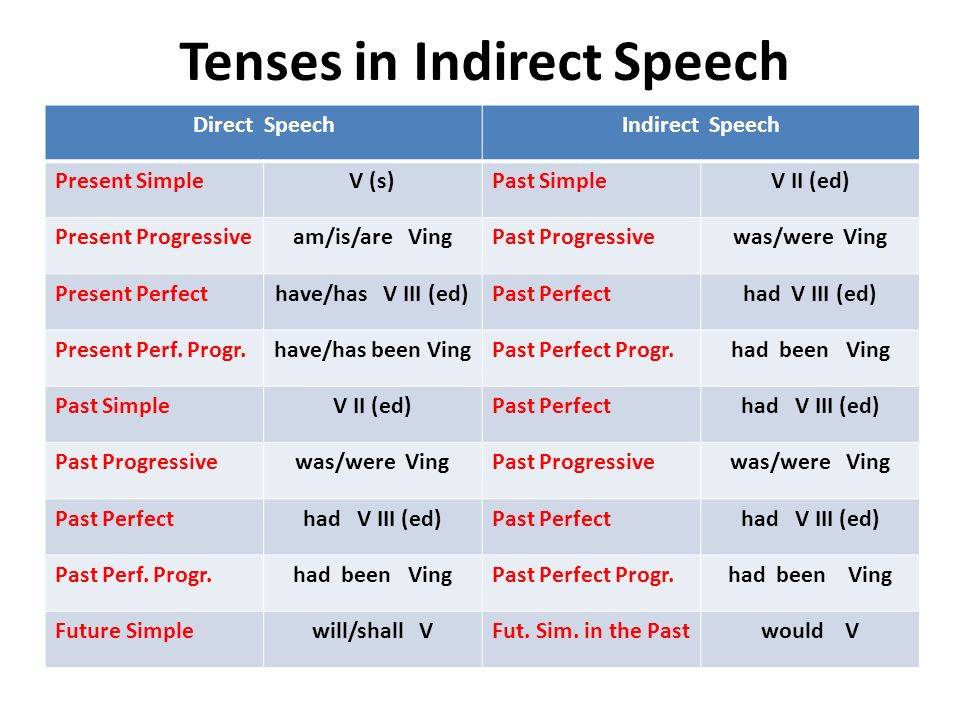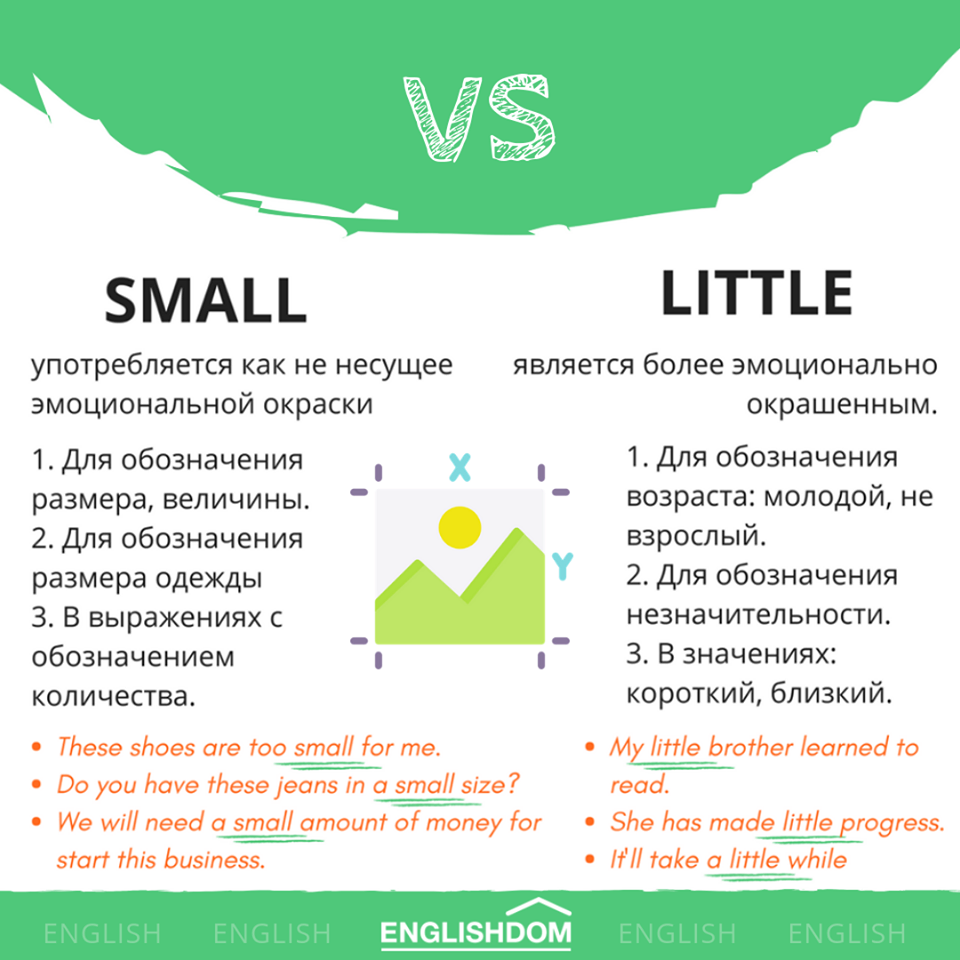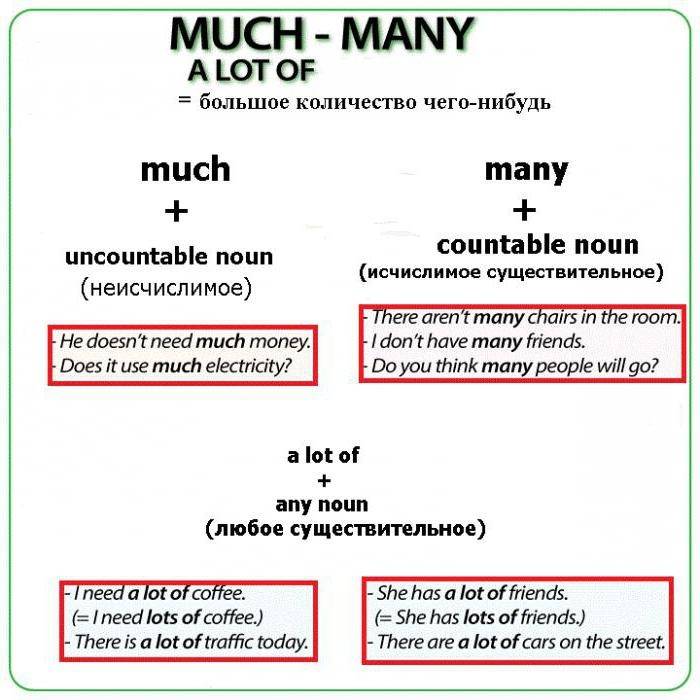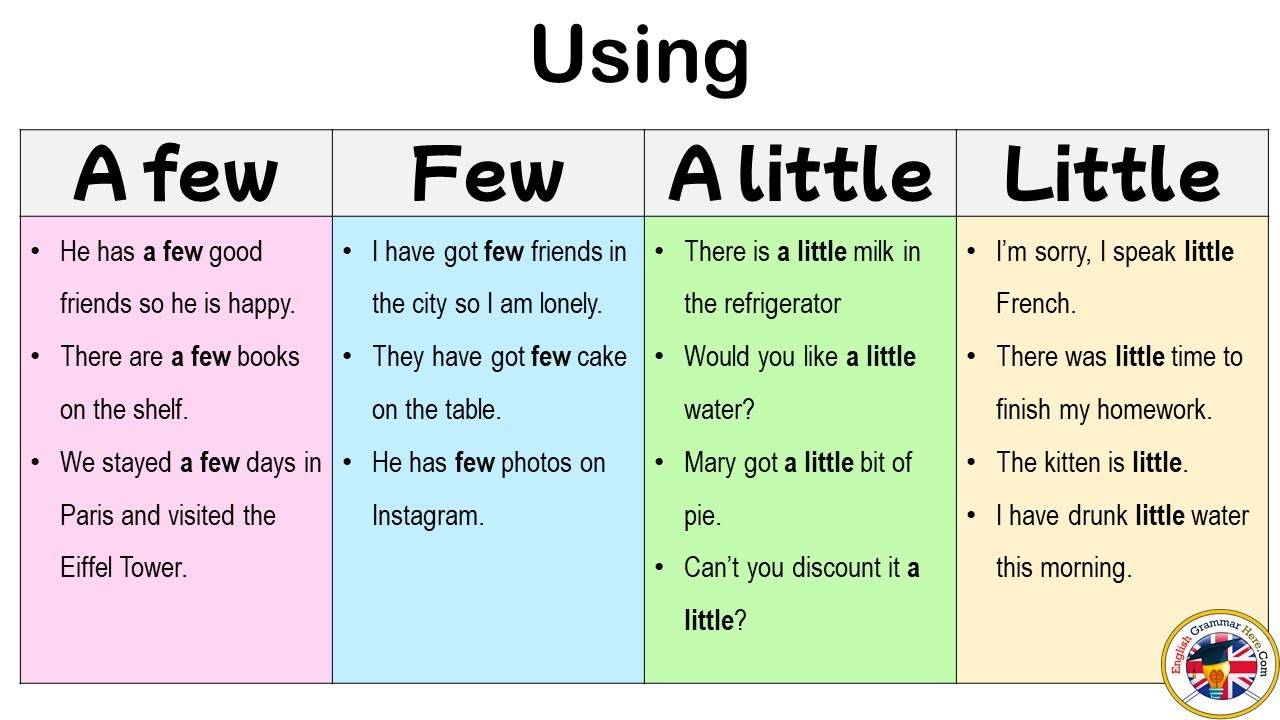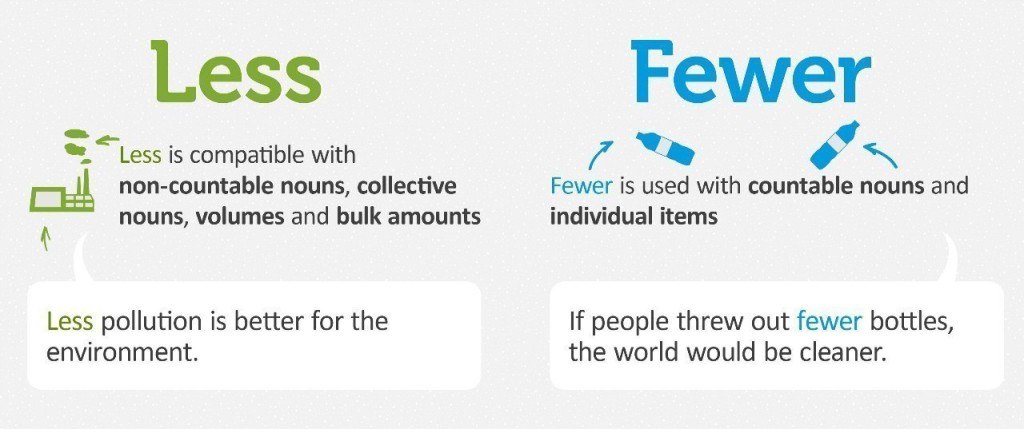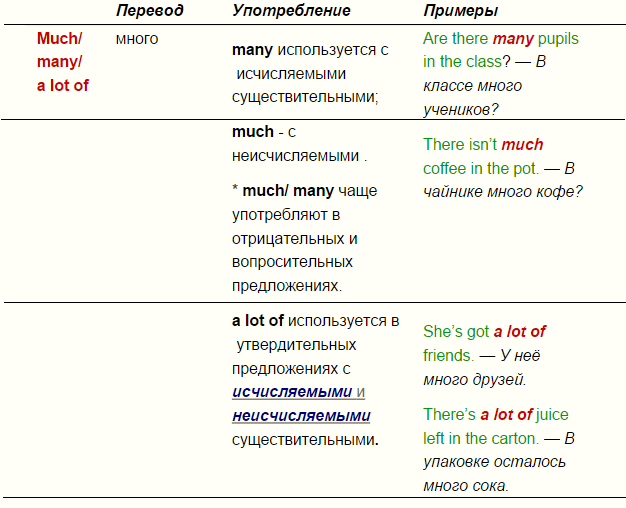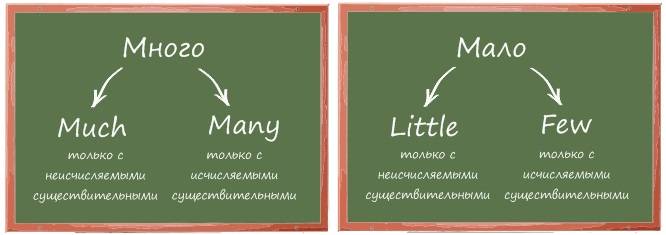Полезные советы по использованию less и fewer
Когда речь идет о количестве, правильный выбор между less и fewer может вызвать затруднения. Однако, есть некоторые полезные правила, которые помогут вам использовать эти слова правильно.
Используйте «less», когда речь идет о неисчисляемых субстанциях или абстрактных понятиях. Например: «less time» (меньше времени), «less money» (меньше денег), «less information» (меньше информации).
Используйте «fewer», когда речь идет о исчисляемых объектах
Например: «fewer cars» (меньше машин), «fewer books» (меньше книг), «fewer people» (меньше людей).
Обратите внимание на контекст. Иногда правильный выбор может зависеть от обстоятельств
Например, правильно использовать «less» в предложении «I have less homework today» (у меня меньше домашней работы сегодня), потому что домашняя работа рассматривается как единый блок, а не разделенная на отдельные задачи.
Если вы не уверены, используйте «less». «Fewer» в основном используется в формальной речи и относится к более конкретным объектам. «Less» является более общим термином и обычно может быть использован без ошибок.
Помните, что правило «less» и «fewer» относится только к количеству. В других контекстах эти слова не имеют значительной разницы. Например, «less complicated» и «fewer complicated» означают одно и то же — «менее сложный».
Использование less и fewer может быть сложным, но с помощью этих полезных советов вы сможете избежать ошибок и использовать эти слова более уверенно.
Fewer than
Fewer than
| FEW |
|---|
Few is a quantifier (determiner) that we use to express a small number of items (count nouns). |
| COUNT NOUN |
In the past, I had a few experiences that didn’t turn out well. |
As a result, I have a few thoughts on how to live well on less money. |
Fortunately, I’ve had a few opportunities that helped me. |
We had a few difficult times to get through. (hardships) |
| FEWER |
|---|
Fewer is the comparative form of few and it expresses a decreased number of items (count nouns). |
Now, I have fewer bad experiences than before. |
I have fewer thoughts than I had in the past about business and money. |
Nowadays, there may be fewer opportunities for young people than there was in the past. |
Now, we have fewer difficult times than we had during the war. |
nowadays (adverbial expression) – these days or years, in the current period of time(decade)
thoughts (N) – ideas or opinions
turn out well (expression) – go well
a few – a sufficient or satisfactory number; enough
few – an insufficient or unsatisfactory number; not much
Also see
Countable and Uncountable Exceptions
Navigating less and fewer is only one of the challenges in navigating countable and uncountable nouns. Yet, even the rule above has its exceptions. Navigating these exceptions will ensure your business communication is natural and accurate.
There are some words that can be used with both countable and uncountable nouns. These are: some, plenty of, a lot of, and any. You can have some employees and plenty of electricity, as well as plenty of employees and some electricity.
Be careful! There are quite a few words that are used as countable nouns even though they are technically uncountable. A good example of this would be coffee. We all say, “I’ll have two coffees, please.” But, this is technically incorrect (it should be two cups of coffee). It is worth remembering that certain nouns (coffee, water, beer, etc.) are uncountable even when used as countable nouns. If you remember that, you will be more likely to choose the correct quantifier. This is important because even though it’s not a problem to say, “I drink two coffees per day,” it is a problem to say, “I need to drink fewer coffees.”
If you are ever in doubt, consult a good dictionary, which will differentiate between countable and uncountable nouns. The nuances of countable and uncountable noun usage may seem small, but they are invaluable to the clarity and ease of your business writing.
Difference between “less” and “fewer”
The main difference between ” is that “fewer” is used when referring to things that can be counted (e.g., there are fewer apples than oranges). And “less” is used when referring to things that cannot be counted.
There is a rule of thumb that “fewer” should be used for things that are smaller in size, while “less” should be used for larger things. However, this rule is only sometimes followed, so it’s best to learn the rules for each specific word.
Less definition
Merriam-Webster defines “less” as:
- Having a smaller quantity, number, or extent. That is usually or customarily present or implied or not as great in magnitude, intensity, or degree as is usual or desired.
- Reduced in status, rank, or importance.
When used as an adverb, “less” typically means “to a smaller extent”: He speaks less fluently than she does.
As a preposition, it can mean “not so much”: I need less sugar in my coffee.
Fewer definition
Fewer refers to a quantitatively smaller number. Two items have fewer total points than three items. In certain contexts, it can indicate a smaller quantity than some other amount, as in “fewer than ten.” For instance, “I only have a few minutes left” refers to a smaller quantity of time remaining than the speaker expects.
When to use ‘less’ versus ‘fewer’
Fewer is an adjective that means a smaller number, and so you use it with countable nouns. Less means a smaller amount, and so you use it with uncountable nouns.
Examples:
- After taking a vacation, you have less time off remaining.
- After taking a vacation, you have fewer days off remaining.
- We saw less information shared during the poorly-timed IT upgrade.
- We saw fewer files transferred during the poorly-timed IT upgrade.
- The northwest factory had less work during the economic slowdown.
- The northwest factory had fewer jobs during the economic slowdown.
- The team will have less space in the new office.
- The team will have fewer desks in the new office.
Surprise! The common grocery store sign “10 Items or Less” is grammatically incorrect. It should state “10 Items or Fewer.”
What are other countable or uncountable nouns?
Fewer and less are not the only words that are unique to one type of noun. For example:
| Countable | Uncountable |
| Fewer | Less |
| Many | Much |
| A few/Few | A little/Little |
| Several | – |
| A couple | – |
Exceptions to the Rule: Less Than vs. Fewer Than
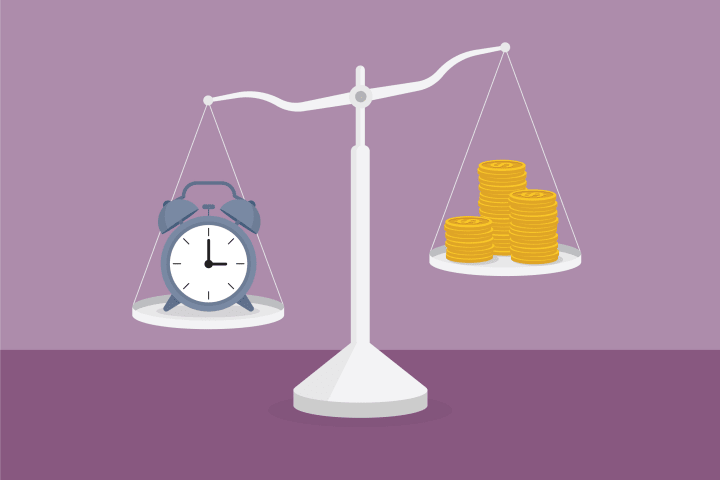 Less time or less money? / tommy/DigitalVision Vectors/Getty Images
Less time or less money? / tommy/DigitalVision Vectors/Getty Images
The exceptions to the rule typically come into play when you’re deciding between fewer than and less than. According to Merriam-Webster, less than is often used for these categories of countable things:
- Distance (e.g. less than 100 yards)
- Money (e.g. less than $100)
- Time (e.g. less than 24 hours)
- Weight (e.g. less than 100 pounds)
- Statistical enumerations (e.g. less than 10,000 people)
The common trend here is that while the modified noun itself is countable, the category isn’t. When you say “less than 100 pounds,” for example, you’re really saying “less weight than 100 pounds.” Weight is what’s being measured; pounds are just a replaceable unit of measurement being used to do it.
In these situations, it can help to think about fractions and mixed units of measurement. Saying “fewer than 24 hours” implies an exact number of hours—but you might actually be talking about 23 hours, 13 minutes, and 3 seconds. Again, what you’re measuring is time, not hours, so less than 24 hours is the better option.
One situation in which this rationalization doesn’t work quite as well is when there are people involved: They usually are counted one by one (averages and percentages excluded) and can’t easily be swapped out for some other unit of measurement. But in many cases, you can still come up with an uncountable noun that justifies the use of less than over fewer than. If you say a stadium can hold less than 10,000 people, you’re measuring an amount of space; if you say less than 10,000 people responded to a poll, you’re measuring an amount of engagement.
Another blanket exception to the fewer-versus-less rule involves the phrase one less. Even if you can count the thing, you still use one less. Nobody says “one fewer problem” or “one fewer lonely girl.”
‘Much’ versus ‘many’
The words “much” and “many” also reveal something about our grocery store signs. They are a lot like “less” and “fewer”: “much” is generally used for things you can’t count, and “many” is used for things you can count. But it is equally acceptable at the grocery store to ask both “How much can I bring through this line? Is this too much?” and “How many can I bring through this line?”
To me, the “how much” questions sound more natural, which would imply that we think of our items on the conveyor belt as a single uncountable mass of groceries rather than countable items — but you can make an argument for either.
What I ask is not that you use “10 items or less” in your own writing; it carries even more risk than using the “one-less-banana” construction. What I ask is that the next time you see a sign that reads “10 Items or Less,” instead of getting upset about the sign, recognize that this isn’t a black-and-white issue and save your anger for something about which we can all agree: the people who go through that line with 40 items should be stopped.
Квантификаторы, употребляемые с любыми существительными
- A lot of (много)
Этот квантификатор универсален. С его помощью можно сказать «много» по-английски и про предметы, которые можно и посчитать, и про те, которые посчитать нельзя.
Пример:
There are a lot of museums in this city. – В этом городе много музеев. There is a lot of snow in the yard. – Во дворе много снега.
- Some/any (несколько, некоторое количество)
Местоимение some используется в утвердительных предложениях, а any заменяет его в вопросах и отрицаниях.
Пример:
There are some eggs in the fridge. But there isn’t any tomatoes. – В холодильнике есть несколько яиц. Но нет томатов.
В связке с квантификатором some, рассмотрим правила употребления a (an) / some. Неопределенный артикль a (an) используется с существительными в единственном числе. «A» ставится перед существительным, начинающимся с согласного звука, а an» – с гласного. Например, a camera – фотоаппарат, an obstacle –препятствие.
Пример:
I bought a coat, an umbrella and some pairs of gloves. – Я купил пальто, зонт и несколько пар перчаток.
В отличие от артиклей a (an), местоимение some может употребляться с исчисляемыми существительными во множественном числе, а также с неисчисляемыми существительными. При выборе any или some правило требует исходить из того, какой тип предложения вам нужен. Если вы строите утверждение, выбирайте some, а если вопрос или отрицание – any.
Пример:
I like some British bands. But I don’t like any German musicians. – Мне нравится некоторые британские группы. Но мне не нравятся немецкие музыканты.
- All (все, всё, вся, весь)
Пример:
She did all the work by herself. – Она выполнила всю работу одна.
- Most (большинство)
Пример:
Most children don’t like going to bed early. – Большинство детей не любят рано ложиться спать.
- None и no — никакой, ни один, нисколько
Отрицательные квантификаторы в английском no/none обозначают отсутствие предметов. No используется перед существительным, а none – без него, самостоятельно. Не забывайте, что а английском не бывает двойных отрицаний. Поэтому предложения с этими квантификаторами нужно строить как утвердительные.
Пример:
There is no lights in the shed. – В сарае нет света.
- Enough (довольно, достаточно)
Пример:
Have you taken enough stuff with you? – Ты взял с собой достаточно вещей?
- Plenty of (много, довольно много)
Пример:
We are not in a hurry. There’s plenty of time left. – Мы не торопимся. У нас еще довольно много времени в распоряжении.
Do we have any nails? None. – У нас есть гвозди? Ни одного.
Квантификаторы в английском языке довольно многочисленны. Не стоит пытаться запомнить их все сразу. Начните с самых популярных и прорабатывайте это тему поэтапно. При возможности попрактикуйте использование местоимений в упражнениях и в устной речи.
Less vs Fewer
Less and Fewer are two words that are often confused when it comes to their meanings and connotations, though there is a notable difference between less and fewer in terms of their usage. Both less and fewer indicate less quantity. In English grammar, such words are known as adverbs of degree or quantity because as the name implies these adverbs talk about the quantity. Less and fewer are actually the comparative forms of the adverbs little and few respectively. Therefore, this article first presents you with the definitions of the two terms, less and fewer, and then explains how the two are used in different ways.
Comparison Degrees of Adjectives — степени сравнения прилагательных
С точки зрения смысла степени сравнения — удобный инструмент уточнения. Мы используем их, чтобы собеседник мог понять особенности предмета обсуждения: «Эта книга интереснее, чем прошлая из той же серии» или «То здание — самое высокое в городе».
С точки зрения словообразования сравнительные степени в английском языке — это три формы прилагательных.
У каких прилагательных есть степени сравнения
Как и в русском, прилагательные в английском бывают относительными и качественными:
Относительные
Указывают на расположение, материал, принадлежность и предназначение предмета или определяют временные рамки. Например: настольная лампа, деревянный стол, заячий хвост, бытовая техника, майская гроза. У них нет степеней сравнения, ведь одна лампа не может быть настольнее другой, а гроза — более майской, чем все остальные.
Качественные
Определяют признак, который может характеризовать предмет, сравнивать его с другими или выделять из всех: добрый — добрее — самый добрый, короткий — короче — самый короткий. Этоти есть формы степеней сравнения прилагательных в английском: базовая/положительная, сравнительная и превосходная.
Базовая обозначается как Positive Degree, это простое прилагательное: green — «зелёный», easy — «лёгкий», deep — «глубокий».
Сравнительная и превосходная формы в английском языке чуть сложнее — с их образованием разберёмся отдельно.
Существительные, которые можно посчитать и те, которые нельзя: основные отличия
В английском языке есть два основных типа существительных: исчисляемые (countable) и неисчисляемые (uncountable). Они отличаются по своему употреблению и сочетаемости с определенными количественными выражениями.
Исчисляемые существительные обозначают отдельные объекты или отдельные единицы чего-либо. Они могут быть посчитаны и иметь какой-то определенный числовой показатель. Примерами таких существительных могут служить: cat (кот), apple (яблоко), book (книга) и т.д.
Неисчисляемые существительные, наоборот, обозначают нечто, что не может быть отдельно посчитано или имеет неопределенный объем. Они представляются в виде абстрактных понятий, веществ или состояний. Примерами неисчисляемых существительных являются: water (вода), information (информация), love (любовь) и т.д.
При использовании таких существительных в английском языке необходимо учитывать различия в образовании и использовании глаголов исчисляемых и неисчисляемых существительных. Так, с глаголами, обозначающими количество или изменение количественного показателя, использование исчисляемых существительных корректно. Например: I have fewer books now (У меня меньше книг сейчас).
С другой стороны, с глаголами, обозначающими некую абстрактную или неподсчитываемую характеристику, следует использовать неисчисляемые существительные. Например: She has less patience than before (У нее меньше терпения, чем раньше).
Таким образом, осознание различий между исчисляемыми и неисчисляемыми существительными позволяет правильно использовать употребление английских существительных в соответствии с их типом.
The History of the Rule
The rule dates back to 1770, when an English writer named Robert Baker covered it in his book :
“ is most commonly used in speaking of a Number; where I should think Fewer would do better. No fewer than a Hundred appears to me not only more elegant than No less than a hundred, but more strictly proper.”
The 1994 edition of Merriam-Webster’s Dictionary of English Usage points out how subjective this is. “Baker’s remarks about fewer express clearly and modestly—“I should think,” “appears to me”—his own taste and preference,” it reads.
It’s not clear how Baker’s opinion became a governing grammar law that we still abide by today. But we do know that people have been using less rather than fewer to modify countable items for at least 1100 years—so don’t let the “10 Items or Less” check-out sign at the grocery store upset you too much.
Are you a logophile? Do you want to learn unusual words and old-timey slang to make conversation more interesting, or discover fascinating tidbits about the origins of everyday phrases? Then get our new book, The Curious Compendium of Wonderful Words: A Miscellany of Obscure Terms, Bizarre Phrases, & Surprising Etymologies, out now! You can pick up your copy on Amazon, Barnes & Noble, Books-A-Million, or Bookshop.org.
What is the difference between fewer vs. less?
We use the words less and fewer to indicate a decreased amount of something in comparison to another, but we don’t use these terms interchangeably. According to Garner’s Modern English Usage, the word “less” emphasizes the appearance of quantity or degree, while the word “fewer” emphasizes a number. This makes sense because “less” is a comparative form of “little” and “fewer” is a comparative form of “few.”
Using Garner’s perspective, it’s easy to see how the terms are inherently different. We use the word “little” to describe an infinite amount of sizes or appearances, but “few” generally denotes a specific number like “a couple,” “a dozen,” or even “some.” For example,
“He weighs less than you!” vs. “He has fewer muscles than you.”
The Associated Press Stylebook expands on these differences by explaining how we should use “fewer” for individual items and “less” for a bulk quantity (“Fewer, less” 106). But this is also where learning less vs. fewer is very complicated. According to Lexico, the proper usage of “less” generally describes a quantity under 10,000, while “fewer” describes individual units with quantities that are less than ten.
Less or Fewer: Practical Examples
Now that we’ve covered the basic rules for using less or fewer, let’s take a look at some practical examples to help you understand the differences.
Countable vs. Uncountable Nouns
One of the easiest ways to remember the difference between “fewer” and “less” is to think about whether the noun is countable or uncountable. Here are some examples:
- Countable Nouns: apples, books, cars, people
- Uncountable Nouns: water, time, money, happiness
When we’re talking about countable nouns, we use “fewer” to indicate a smaller number. For example:
- There are fewer apples in the basket than there were yesterday.
- I have fewer books on my shelf than my friend does.
When we’re talking about uncountable nouns, we use “less” to indicate a smaller amount. For example:
- I need less water in my tea than you do.
- We have less time to finish this project than we thought.
Less or Fewer: Comparisons
Another way to use less or fewer is in comparisons. Here are some examples:
- Fewer than: Use “fewer than” when you’re comparing two countable nouns. For example: There are fewer apples than oranges in the basket.
- Less than: Use “less than” when you’re comparing two uncountable nouns. For example: I have less money than I did last year.
- More or less: Use “more or less” to indicate an approximate amount. For example: It will take me more or less an hour to get to the airport.
Using Both “Fewer” and “Less” in the Same Sentence
Sometimes, you may need to use both “fewer” and “less” in the same sentence. Here’s an example:
I have fewer apples, but less time to eat them.
In this sentence, we’re using “fewer” to indicate a smaller number of apples, and “less” to indicate a smaller amount of time.
Less vs. Fewer
Fewer and less are commonly confused words in English, or rather, less is used while fewer tends to fall by the wayside.
When to Use Less
Less is used when talking about things that are uncountable or have no plural. It is compatible with collective nouns, uncountable nouns, and volumes.
- The moon yields less light than the sun.
- We must try to spend less money.
- Many women earn less than their male colleagues.
When to Use Fewer
Fewer is used when talking about things or people in the plural. It is used countable nouns and individual items.
- She needs fewer clothes this month.
- Women commit fewer crimes than men.
- I’ve got fewer tasks than I used to have.
Глаголы-заменители в кратких ответах
Вспомогательные глаголы to do, to be, to have, will могут заменять смысловые в кратких ответах на вопросы.
Полный ответ на вопрос звучит так:
Краткий ответ состоит из подлежащего и вспомогательного глагола:
Почему здесь именно «did», а не «do» или «does»? Потому что глагол «took» в вопросе взят в форме прошедшего времени Past Simple, а глагол в Past Simple мы заменяем на глагол to do тоже в Past Simple, то есть на «did», как я уже объяснял выше.
Другие примеры:
Вопрос в Present Simple:
В предложениях с глаголом to be мы подставляем тот вспомогательный глагол, который использовался бы и в полной версии ответа. Просто отсекаем все, что шло бы после него. Это касается как предложений, где to be — основной глагол, таких как «I am sure», так и предложений, где to be служит для образования времен Continuous вместе со смысловым глаголом, например: I am waiting.
Вопрос в предложении, где to be — основной глагол:
What’s the difference?
Mistakes and inefficiency are different types of nouns. Mistakes is a countable noun while inefficiency is uncountable.
Countable nouns are ones where you can count the individual singular nouns that make up the plural noun. Examples of countable nouns are invoices, products, ideas, and employees. You can count the number of employees, whether there is one employee or 1,000 employees. The word employee can be made plural, and therefore, you can count the word employee.
Uncountable nouns, or mass nouns, cannot be separated and counted because there is no discrete part of the noun that is separate from the whole. Examples of uncountable nouns include productivity, money, and electricity. You can have a lot of productivity, but you cannot count one productivity, two productivities, and so on. The same goes for money: we count dollars and cents all the time, but you cannot count one money or 1,000 monies.
When to Use Fewer vs. Less
The rule itself is pretty simple. Use fewer to modify things you count the number of, and use less to modify things you measure the amount of. You ordered fewer pancakes than your sister, so you needed less syrup. There were fewer people in the diner today than there were yesterday, so it took less time to be seated. Another way to think of it is in terms of singular versus plural. Less usually modifies singular nouns, while fewer pairs with plural ones.
People usually err on the side of less. You probably wouldn’t accidentally say “fewer syrup” or “fewer time,” but you might say “less pancakes” or “less people.” Here’s an easy way to keep the terms straight: Put three before the noun in question. If it makes sense—three pancakes, three people—go with fewer. If it sounds weird—three syrup, three time—then stick with less.
Decreasing the type or quality something
Fewer vs. Less
| FEWER + MODIFIER + NOUN |
|---|
Fewer is used to indicate a decreased number of count items . Fewer modifies the noun. |
In the past, we used toxic chemicals in our garden. Now, we use fewer toxic products. |
We used to have a lot of interesting conversations. Now, we have fewer interesting conversations. |
Kids used to have a lot of opportunities to find work. |
The police will carry fewer weapons. |
We’ve had fewer good experiences staying in hotels. |
We used to receive a lot of newspapers. Now we receive fewer papers — only two “The Wall Street Journal” and “The Chronicle”. |
| LESS + MODIFIER + NOUN |
|---|
Less is used to decrease the amount (percentage) or the degree of something. Less modifies the modifier. |
We use less toxic products. (a smaller percentage of toxins) |
We have less interesting conversations. (a smaller amount of interest) |
Today’s kids have less appealing opportunities to work. (a smaller amount of appeal, attractiveness) |
The police will carry less dangerous weapons. (causing a smaller amount of damage) |
The journalist has had less useful experience¹(s)². (a smaller amount of usefulness) |
used to + verb – past routine, custom, habit, “in the past”
toxic (Adj) –
poisonous, capable of killing or damaging (chemicals)
appealing (Adj) – attractive or interesting
¹experience (noncount noun) – knowledge or skill
²experiences (count noun)–things that happen to you or things you do
See Nouns that are .
More or Less
| MORE + MODIFIER |
|---|
We use more or -er to increase the intensity of a modifier in a comparative statement. See More / -er than. |
| ADJECTIVE |
In the past, people were more likely / likelier to die of cancer. |
Scientists are more optimistic about finding a cure. (hopeful) |
| ADVERB |
People speak more enthusiastically about their chances of survival. |
People live more actively than they did before. |
| LESS + MODIFIER |
|---|
We use less to decrease the intensity of a modifier in a comparative statement. |
| ADJECTIVE |
We are less likely to die of cancer than people were fifty years ago. |
Scientists are less optimistic about their clinical trials. |
| ADVERB |
People speak less enthusiastically about their treatment. |
People live less actively than they did before. |
more or less (expression) – to a varying degree; approximately, about
likely – will probably happen or is probably true
Related pages: More /-er Most / -est , The-Superlatives
‘Fewer’ in a Sentence
- She has fewer friends now than she did in high school.
- He has fewer responsibilities at his new job.
- The store has fewer customers today than it did yesterday.
- She ate fewer cookies than she planned to.
- He has fewer grey hairs than his father.
- The company has fewer employees now than it did last year.
- She has fewer clothes in her closet than her sister does.
- He has fewer chances to see his family now that he lives far away.
- The city has fewer traffic jams now than it did a few years ago.
- She has fewer hobbies now than she did when she was younger.
- He has fewer books on his shelves now than he did before.
- The movie had fewer special effects than the book.
- She has fewer fears now that she has faced them.
- He has fewer allergies now that he has gotten older.
- The company has fewer resources now due to budget cuts.
- She has fewer clothes than she did before she moved.
- He has fewer toys now that he has grown up.
- The town has fewer restaurants than the city.
- She has fewer cooking skills than her sister.
- He has fewer qualifications than the other job applicants.
- The restaurant has fewer menu options than it did last year.
- She has fewer interests now than she did in the past.
- He has fewer hobbies now than he did when he was a teenager.
- The museum has fewer exhibits on display this month than last.
- She has fewer doubts about her abilities now than she used to.
Примеры из реальной жизни
Вот несколько примеров, которые позволят лучше понять разницу между «fewer» и «less» в контексте реальной жизни:
В ресторане: Если вы видите на меню «Less sugar» или «Reduced sugar», это означает, что в блюде будет меньше сахара по сравнению с обычной версией. Например, напиток со «less sugar» будет содержать меньше граммов сахара, чем тот, где написано «regular». С другой стороны, если на меню написано «Fewer calories», это означает, что блюдо будет содержать меньше калорий.
В супермаркете: Когда вы проходите мимо раздела с овощами и фруктами, вы можете увидеть объявления о «Less waste» или «Reduced waste». Это означает, что магазин принимает меры по снижению количества отходов и стремится уменьшить потери продуктов. С другой стороны, если вы видите объявления о «Fewer plastic bags» или «Reduced plastic bags», это означает, что магазин поощряет клиентов использовать меньше пластиковых пакетов.
На упаковке товаров: При покупке продуктов вы можете заметить надпись «Less sodium» или «Reduced sodium» на упаковке. Это означает, что количество натрия в продукте было уменьшено по сравнению с обычной версией. С другой стороны, если на упаковке написано «Fewer preservatives» или «Reduced preservatives», это означает, что количество консервантов было сокращено.
Это всего лишь несколько примеров, которые помогут вам правильно использовать «fewer» и «less» в повседневной речи и понять их различие.
One less complaint
Using the “singular or plural” rule also explains another “exception.” People often think phrases such as “one less banana” are wrong because you can count bananas, but “one less banana” is correct because it is singular and you use “less” with singular nouns.
“One less banana” and similar phrases put you in a tricky situation because they are correct, but many people think they are wrong. For example, I got grammar-related complaints after Gardasil launched its “one less person affected with HPV” ads because many people thought it was grammatically incorrect. Therefore, I recommend avoiding the construction whenever possible. It’s better to rewrite your sentence than to have people think you’ve made a mistake or to knowingly use the wrong word by writing “one fewer X.” You really can’t win whether you write “one less banana” or “one fewer banana.” So rewrite. Instead of telling your caterer “We need one less banana in the fruit bowl,” avoid the controversial sentence by asking her to “Take one banana out of the fruit bowl.”
Когда использовать less в сравнении
Фразы «less» и «fewer» оба относятся к сравнению количества или числа предметов или сущностей. Однако есть небольшая разница в контексте, в котором они используются.
Когда мы говорим о «less», мы обычно относимся к нематериальным или неопределенным субъектам. Например, мы используем «less» для указания на уменьшение количества жидкости, времени, энергии или абстрактных понятий. Например, «У меня осталось меньше времени на выполнение задания» или «Она получила меньше удовлетворения от этого решения».
С другой стороны, когда мы говорим о «fewer», мы обычно говорим о конкретных, подсчитываемых предметах или людях. Это может быть количество предметов, людей, денег или других вещей, которые можно пересчитать. Например, «Я считаю меньше денег в своем кошельке» или «На этой неделе было меньше посетителей в нашем магазине».
Важно помнить, что использование «less» или «fewer» зависит от контекста, в котором вы используете эти слова. Если вы не уверены, какое слово использовать, лучше всего проверить его в словаре или использовать предложение, чтобы получить обратную связь от носителей языка
The ‘singular versus plural’ rule
As I said, that’s the simple rule, and the one you’ll hear most often, but another way to think about the difference that also takes care of some of the exceptions to the simple rule is to use “less” for singular nouns and “fewer” for plural nouns. For example, the Chicago Manual of Style recommends using the “singular or plural” framework, as do I.
For the easy nouns, it works the same way:
| Singular: Less | Plural: Fewer |
|---|---|
| Candy is . . . less candy | M&Ms are . . . fewer M&Ms |
| Water is . . . less water | Glasses of water are . . . fewer glasses of water |
| Potato salad is . . . less potato salad | Potatoes are . . . fewer potatoes |
Less or Fewer: Common Misconceptions
When it comes to using less or fewer correctly, there are some common misconceptions that can make it confusing. Here are a few things to keep in mind:
Misconception 1: “Less” is always used for uncountable nouns, and “fewer” is always used for countable nouns.
While it’s true that “less” is typically used for uncountable nouns and “fewer” is typically used for countable nouns, there are some exceptions. For example, when referring to money, “less” is usually used even though money can technically be counted. Here are some examples to help clarify:
- Correct: I have less money than I did yesterday.
- Incorrect: I have fewer money than I did yesterday.
Misconception 2: “Less” is always used for amounts, and “fewer” is always used for numbers.
While it’s true that “less” is typically used for amounts and “fewer” is typically used for numbers, there are some exceptions. For example, when referring to time, “less” is usually used even though time is technically a number. Here are some examples to help clarify:
- Correct: I have less time than I thought I did.
- Incorrect: I have fewer time than I thought I did.
Misconception 3: “Less” is always used for comparisons, and “fewer” is always used for quantities.
While it’s true that “less” is typically used for comparisons and “fewer” is typically used for quantities, there are some exceptions. For example, when referring to distance, “less” is usually used even though distance is technically a quantity. Here are some examples to help clarify:
- Correct: It’s less than a mile to the store.
- Incorrect: It’s fewer than a mile to the store.
Misconception 4: “Less” is always used for abstract concepts, and “fewer” is always used for concrete concepts.
While it’s true that “less” is often used for abstract concepts and “fewer” is often used for concrete concepts, there are some exceptions in real life.
You will often hear less used with plural countable nouns in informal spoken situations, but traditionally it is not considered to be correct:
Remember, while these guidelines can be helpful, there are always exceptions to the rule. It’s important to pay attention to the context of the sentence and use your best judgment when deciding between “less” and “fewer.”

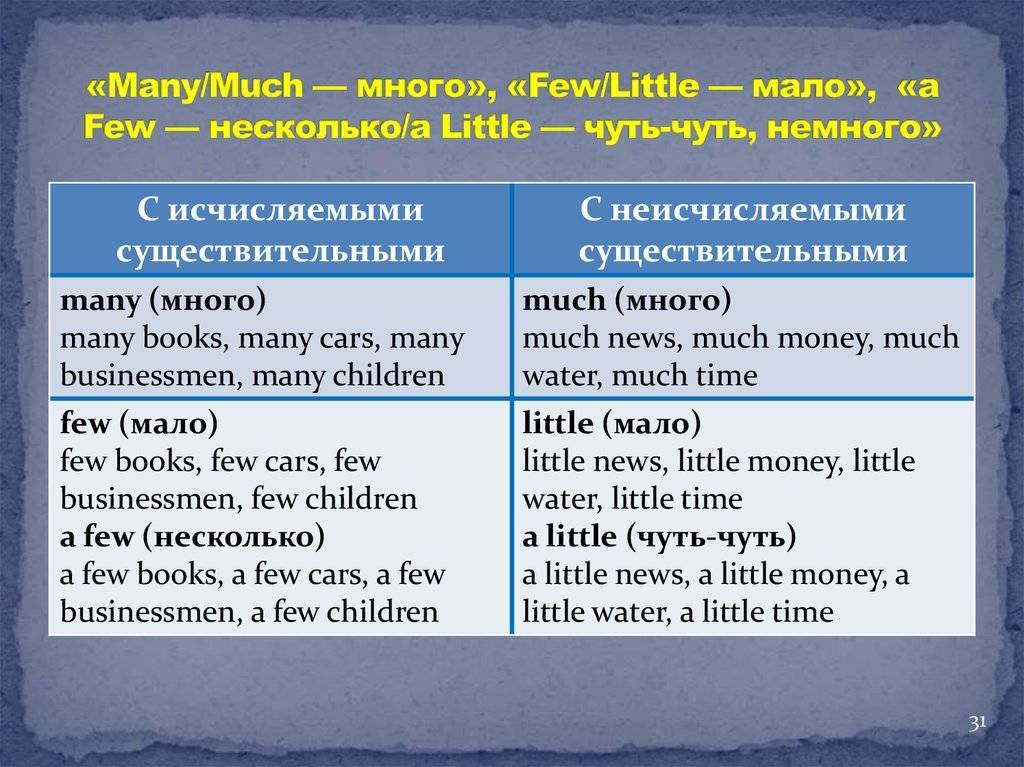
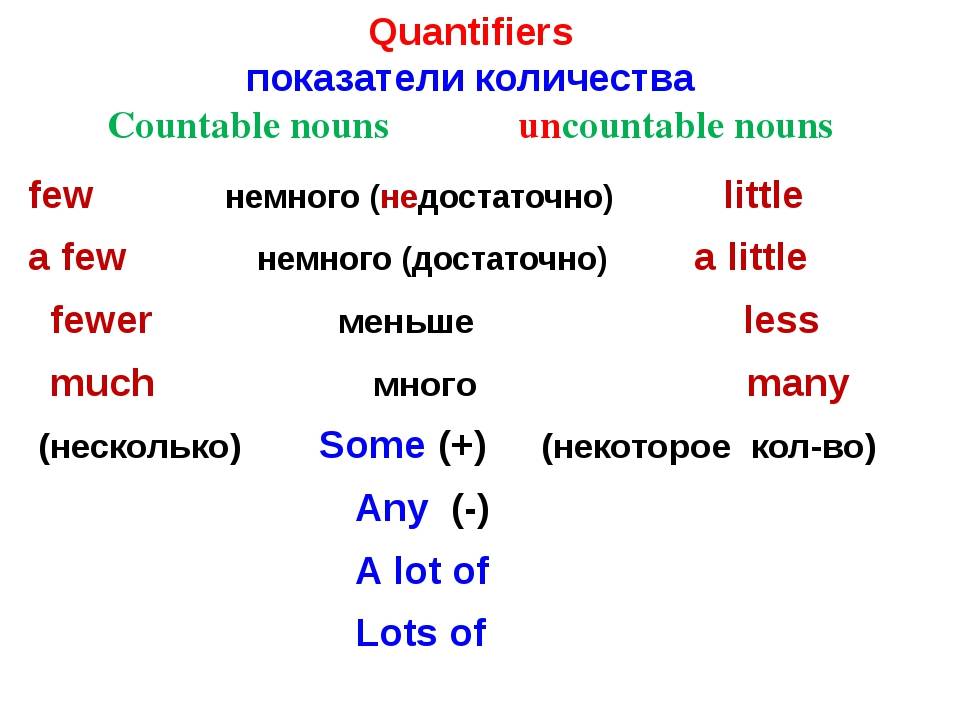
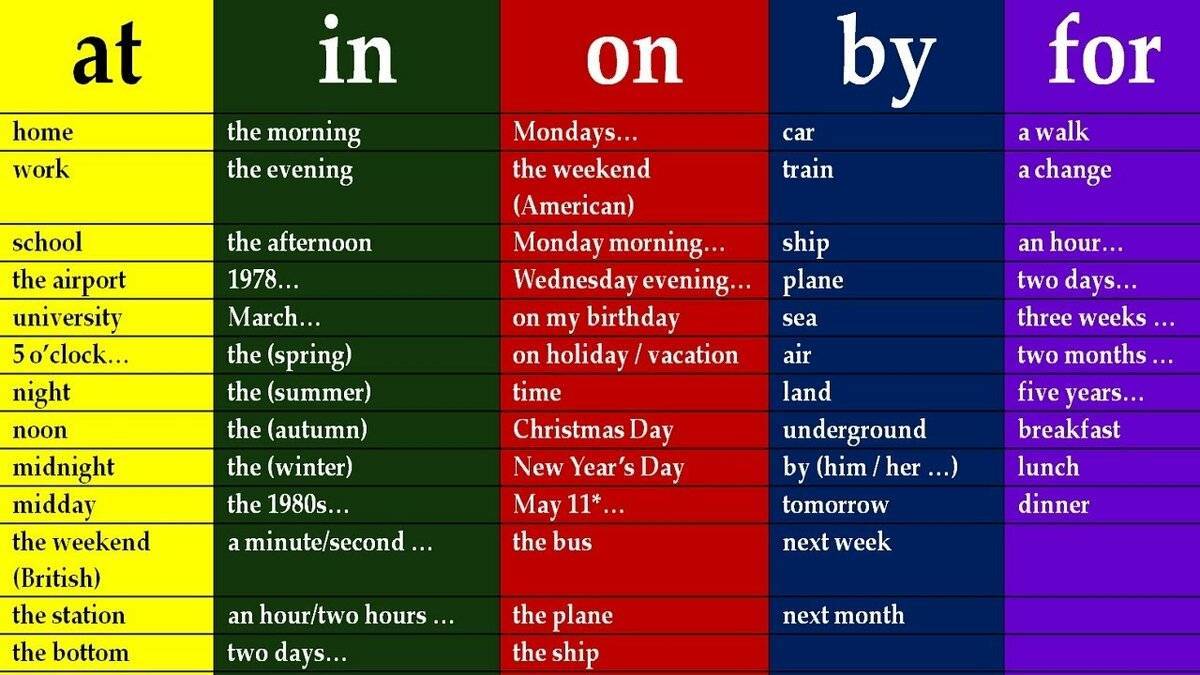

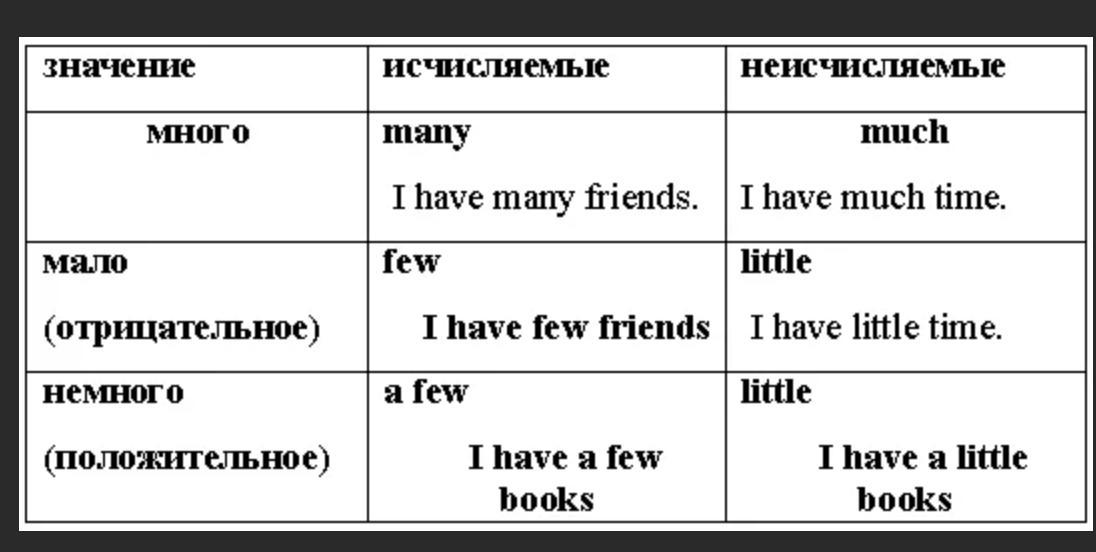
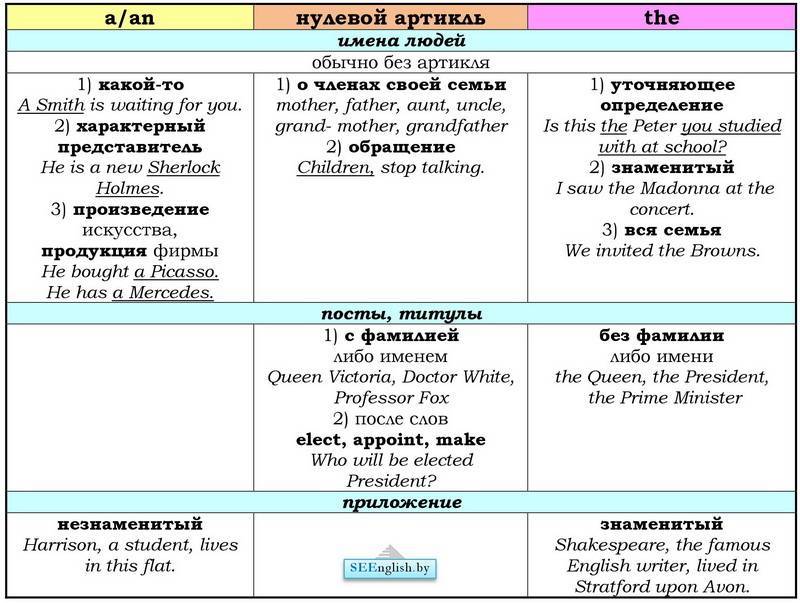
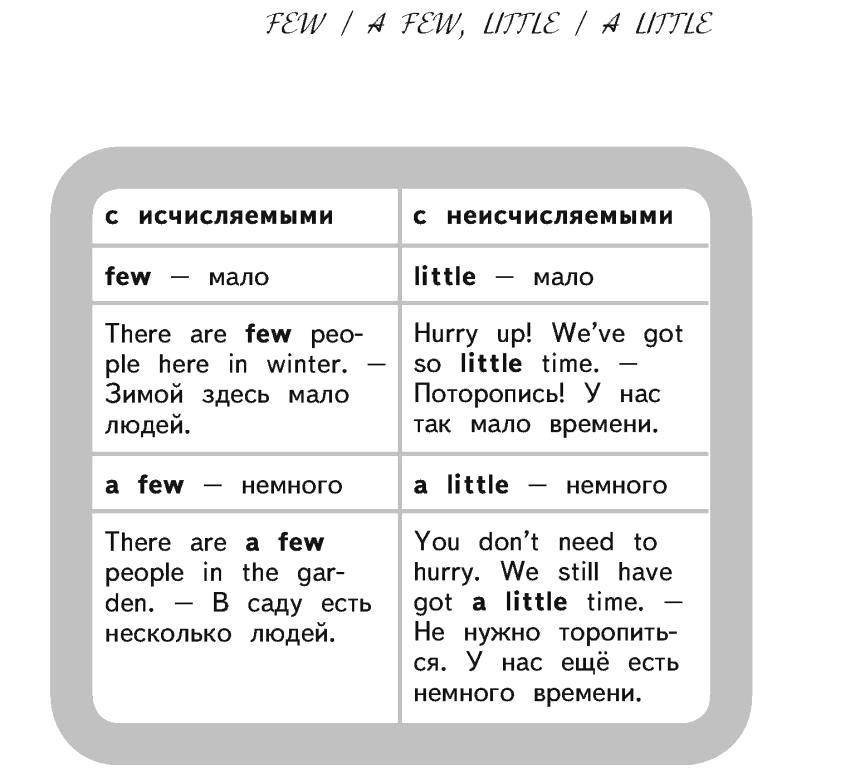
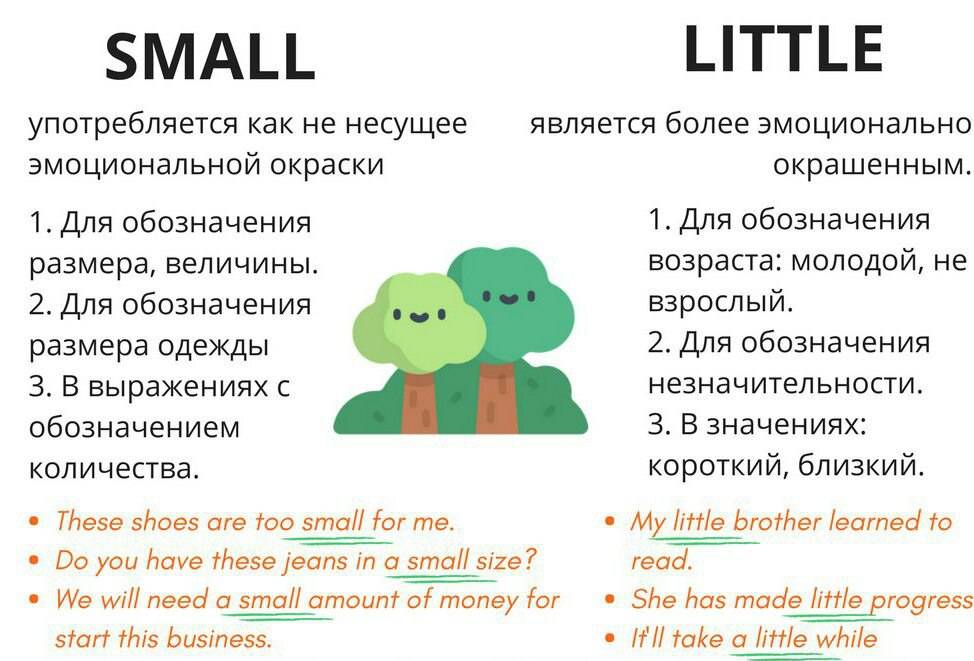


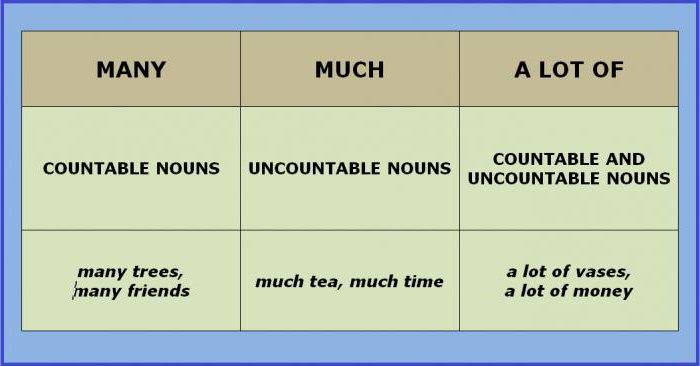
![Fewer vs. less [how to use correctly]](https://raznicynet.com/wp-content/uploads/b/5/e/b5ee112a9dc13a8b1daf9987dbd58523.jpeg)

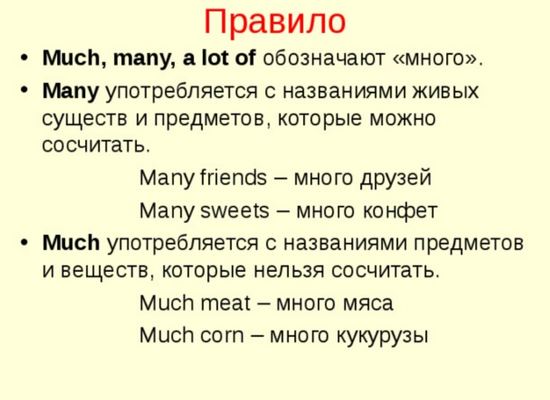

![Fewer vs. less [how to use correctly]](https://raznicynet.com/wp-content/uploads/8/8/b/88b79d0a2bcc3c9902146df23db5292e.jpeg)
